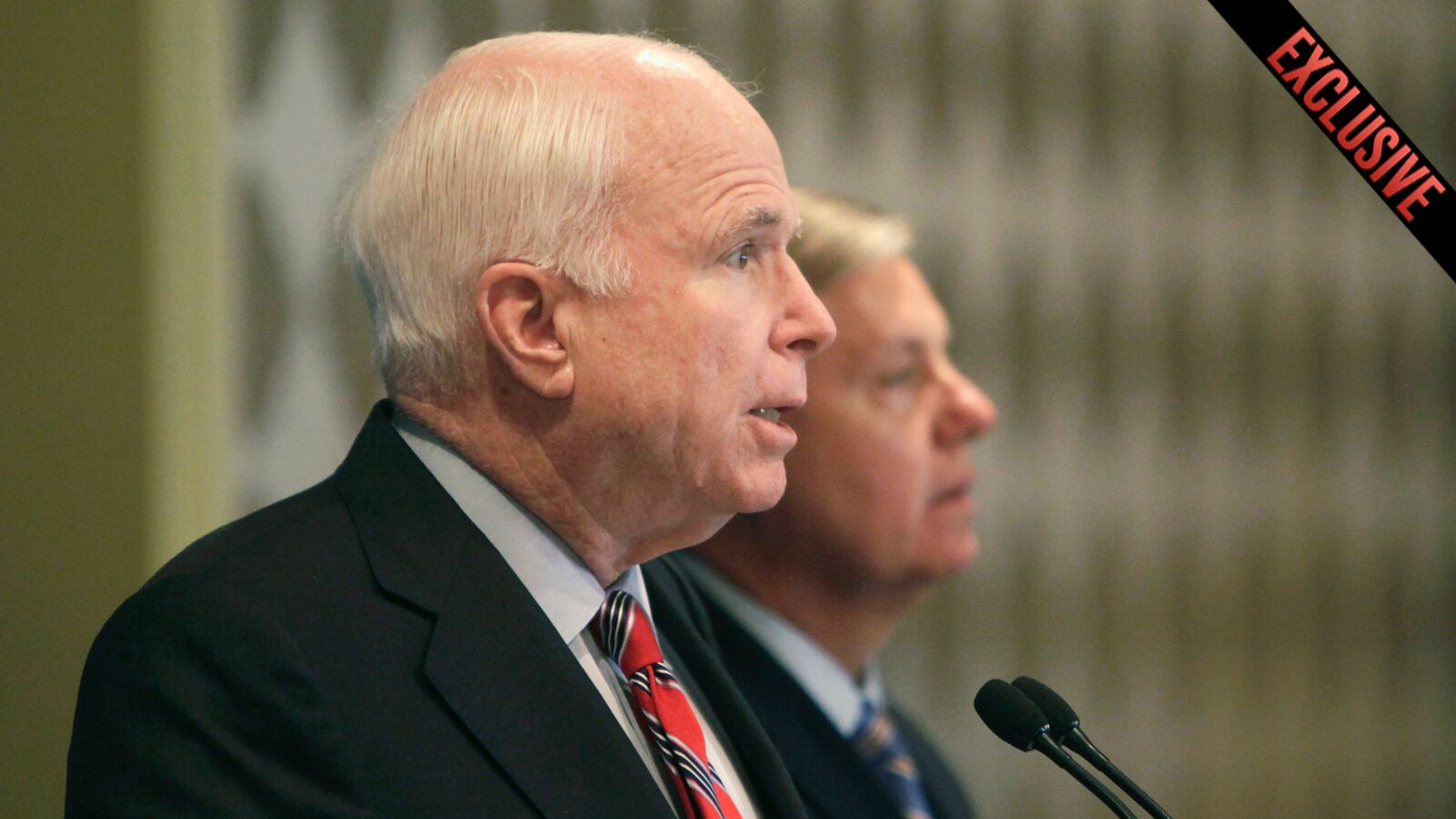During their whirlwind tour of Cairo Tuesday, two top GOP senators held the most extensive meeting to date between U.S. officials and senior officials in the embattled Muslim Brotherhood, whose supporters are fighting in the streets to overturn last month’s military takeover of Egypt.

Sens. John McCain (R-AZ) and Lindsey Graham (R-SC) also met with Egyptian Prime Minister Hazem el-Beblawi, the leader of the military takeover Gen. Abdel Fattah al-Sisi, Vice President Mohamed ElBaradei, local political party leaders, and civil society representatives. But their meeting with Muslim Brotherhood leaders was perhaps the most important in their effort to help the administration push both sides back to the negotiating table and end the violence that has seen 400 Egyptians killed in just over a month.
“We met some Muslim Brotherhood representatives. They were senior-level people,” McCain told The Daily Beast Tuesday in an exclusive interview from Cairo, adding that the officials requested to remain anonymous. “They believe things are going to get a lot worse before they get better. They demand that [deposed President Mohamed] Morsi get released. They believe it was a military coup and they are very far apart from the military and the new government.”
McCain and Graham also believe the removal and imprisonment of Morsi and several other Muslim Brotherhood leaders was a military coup, one that could mandate a cutoff of $1.3 billion of U.S. military aid to Egypt. The Obama administration has avoided saying whether or not they believe there was a coup in Egypt.
“We have determined that we do not need to make a determination on Egypt,” State Department spokeswoman Jen Psaki said this week.
Nevertheless, McCain and Graham told the Muslim Brotherhood leaders that they should be open to negotiations with the new government if and when the government makes some concessions that international actors are pushing for, such as letting up on the arrests and prosecutions of the leadership of the deposed group.
“We told [the Muslim Brother leaders] that in our view, the best way to resolve this issue was to renounce and condemn violence, that they should be willing to negotiate if some of the brotherhood were released from prison,” McCain said. “We were not negotiating, we were just saying what we thought had to be done to get back to the negotiating table.”
The senators were not in Egypt at the behest of the Obama administration; they decided to go on their own but did receive the “blessing” of the White House, McCain said. Despite being two of the administration’s fiercest critics on foreign policy for years, they have found themselves cooperating with President Obama more in recent weeks and were granted a rare two-hour meeting with Obama last month to discuss Egypt, Syria, and other foreign-policy issues.
McCain and Graham happen to be in Cairo at the same time as Deputy Secretary of State Bill Burns, who was working toward the same goal of bridging the gap between the Muslim Brotherhood and the new government. Burns is working in tandem with Qatari Foreign Minister Khalid bin Mohammad al-Attiyah, UAE Foreign Minister Abdullah bin Zayed Al Nahyan, and EU envoy Bernardo Leon.
Burns extended his trip in the hopes of bringing the two sides together, but no progress was reported. The group went to an undisclosed prison Tuesday and met with one senior Muslim Brotherhood figure, Khairat el-Shater. McCain and Graham also had a long meeting with Burns Tuesday, but McCain declined to say whether Burns was making any headway.
Following the senators’ meetings with military and government leaders, McCain said he was not too optimistic.
“The situation is very difficult here,” he said. “The two sides are polarized, and the Morsi supporters are still demonstrating, and the military and the new government are keeping a lot of the Muslim Brotherhood leadership in jail without communication in unknown places. It’s not a good situation, and we’ve recommended that some of them be released as a goodwill gesture. The only way this will get resolved is if both sides are willing to make some concessions.”
McCain and Graham told the government that the American aid was in jeopardy because of congressional angst about the military takeover. He acknowledged that America’s $1.3 billion in aid pales in comparison with the over $13 billion in aid promised to the new government in recent weeks by Gulf countries such as the UAE and Saudi Arabia, but insisted that America still has significant leverage in Egypt.
“We told [General al-Sisi] exactly how a lot of members of Congress felt and we want to see negotiations and some release of political prisoners,” he said. “He did not say whether he would or he wouldn’t.”
The Egyptian media panned the senators’ visit, but McCain said that was predictable because the media is has been “very strongly pro coup” so any advocacy of a compromise or concessions to the Muslim Brotherhood was likely to invite severe criticism.
As for the Obama administration’s handling of the crisis, McCain said that Secretary of State John Kerry did not strike the right tone when he said last week that “the military did not take over,” comments he later had to walk back.
“As for John Kerry’s comments, I would not share that view, but as far as Bill Burns, I have great confidence in him and the work that he does,” McCain said. “The next few weeks are critical in Egypt as to whether we see a real resumption of violence.”
Correction: The original version of this article incorrectly named the foreign minister of the UAE. It is Abdullah bin Zayed Al Nahyan.





